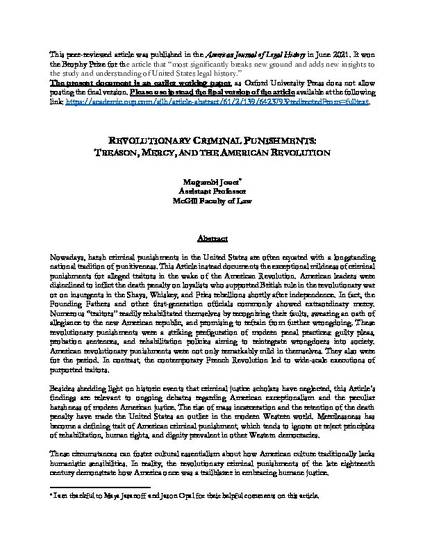
Article
Revolutionary Criminal Punishments: Treason, Mercy, and the American Revolution
American Journal of Legal History
(2021)
Abstract
This article focuses on the exceptional mildness of criminal punishments for alleged traitors in the wake of the American Revolution. American leaders were disinclined to inflict the death penalty on loyalists who supported British rule in the revolutionary war or on insurgents in the Shays, Whiskey, and Fries rebellions shortly after independence. In fact, the Founding Fathers and other first-generation officials commonly showed remarkable mercy. Numerous “traitors” readily rehabilitated themselves by recognizing their faults, swearing an oath of allegiance to the new American republic, and promising to refrain from further wrongdoing. These revolutionary punishments were a striking prefiguration of modern penal practices: guilty pleas, probation sentences, and rehabilitation policies aiming to reintegrate wrongdoers into society. While American revolutionary punishments comprised stark racial inequities and did not constitute a lost utopia, they were particularly mild for the period. In contrast, the contemporary French Revolution led to wide-scale executions of purported traitors. Besides shedding light on historic events that criminal justice scholars have neglected, the article’s findings are relevant to ongoing debates about American exceptionalism and the peculiar harshness of modern American justice, including originalist and non-originalist interpretations of the Eighth Amendment. The rise of mass incarceration in the United States and its retention of the death penalty can foster cultural essentialism about how American culture traditionally lacks humanistic sensibilities. In reality, the revolutionary criminal punishments of the late eighteenth century demonstrate how America was once a trailblazer in embracing humane conceptions of justice.
Keywords
- American Revolution,
- Death Penalty,
- Mass Incarceration,
- Criminal Law,
- Criminal Procedure,
- Criminal Punishment,
- Criminology,
- Dignity,
- International Human Rights,
- Race,
- Eighth Amendment,
- United States,
- France,
- Comparative Law,
- War,
- Legal History,
- Enlightenment,
- French Revolution,
- Loyalists,
- Treason
Disciplines
Publication Date
Summer June 1, 2021
DOI
https://doi.org/10.1093/ajlh/njab001
Citation Information
Mugambi Jouet. "Revolutionary Criminal Punishments: Treason, Mercy, and the American Revolution" American Journal of Legal History Vol. 61 Iss. 2 (2021) p. 139 - 176 Available at: http://works.bepress.com/mugambi-jouet/4/
